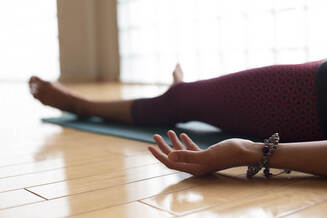 (By Grace Rollins, MS, LAc) You may think that as an acupuncturist my most important duty is to “put pins in people,” as many of my patients like to phrase it. This is true to a degree, but I don’t always use needles to treat people, and when I do there’s something even more basic and arguably more important that I do for each patient that comes in. It sounds simple, but is easier said than done: It’s to get every patient to lay flat, quiet, and still. Hyper-vigilance is common among many of my patients as a consequence of trauma, or a function of our modern over-busy, over-stimulated, over-stressed way of life. It manifests as nervousness, anxiety, muscle tension and guarding, digestive issues, over-sensitivity to pain, sleep disorders, blood pressure issues, hormonal imbalances, cognitive and behavioral disorders, immune imbalances, and even inflammation and poor injury healing. It’s the kind of root cause that most medical doctors are helpless to address, yet relates to so many of our society’s chronic health issues. Over the years I've observed many different patterns of vigilance in my patients. There are those who, when asked to lay down, stay upright on the table while trying to talk or explain things to me, and need to be told another time or two to lay down so I can start examining. There are those who, upon laying down, seem uncomfortable with stillness, talking a lot (often with the hands), asking a lot of questions, keeping the eyes open and watchful, and tensing up the body. Hyper-vigilant patients often take shallow breaths at a fast pace, and they tend to be more intolerant of needle sensation. I consider some nervousness to be normal if experiencing acupuncture for the very first time, but I see guarding sometimes in patients I've known for years and whom I know to look forward to their appointments. It’s a clear sign to me that their nervous system is in an over-stressed, over-protective state. More of a problem in recent years, I also get patients who delay in putting their phones away or even must have one at their side. I can sympathize with the occasional pending emergency or urgent matter, but for some folks this is a constant need. Being unable to tolerate an hour of isolation is a form of extreme vigilance. From fight-or-flight to rest, assimilate and heal How easily a patient can lay flat, tolerate stillness and endure disconnection from their phone can tell me a lot about the state of their autonomic nervous system (ANS), the branch of our nervous system that controls many of our autonomic functions such as heart rate, digestion and blood pressure. When the autonomics are more sympathetic branch-dominant, the patient is revved up, in fight-or-flight mode. In a sympathetic dominant-state it's hard to sleep, digest properly and repair the body. Blood circulation is impeded, muscles get tight (especially in the neck and back) and the mind tends to feel anxious.
7 Comments
|
AuthorWrite something about yourself. No need to be fancy, just an overview. Archives
June 2024
Categories |
 RSS Feed
RSS Feed